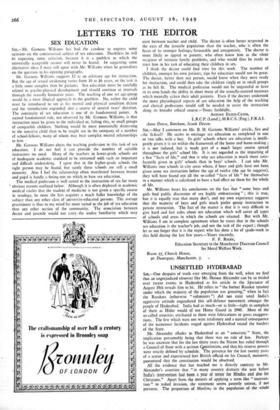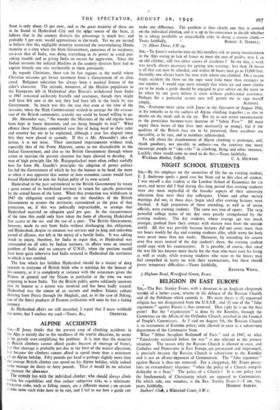UNSETTLED HYDERABAD Sin,—One despairs of truth ever emerging from the
well, when we fmd that an unprejudiced observer like Mr. Horace Alexander can be so misled over recent events in Hyderabad as his article in the Spectator of August 19th reveals him to be. He refers to " the former Razakar tyranny under which the majority of the population was groaning," when in fact the Razakars (otherwise " volunteers ") did not exist until India's aggressive attitude engendered this self-defence movement amongst the people of Hyderabad. India had as much—or as little—right to complain of them as Hitler would of our Home Guard in 1940. Most of the so-called atrocities attributed to them were fabrications or gross exaggera- tions. The few which were not were retaliatory and a natural consequence of the numerous incidents staged against Hyderabad round the borders of the State.
Mr. Alexander alludes to Hyderabad as an " autocratic " State, the implication presumably being that there was no rule of law. Perhaps he was unaware that for the last thirty years the Nizam has ruled through a Council of State with a writtenCeisititution, and that, his reserve powers
were strictly defined by schedule. e presence for the last twenty years of a senior and experienced lent British official on his Council, moreover, guaranteed that the constitution would be observed.
All the evidence that has reached me is directly contrary to Mr. Alexander's assertion that " in many country districts the year before
India's intervention had been a year of terror for Hindus and also for
Christians." Apart from the meiosis of applying a term like " interven- tion" to naked invasion, the statement seems patently untrue, if not perverse. The proportion of Muslims in the population of the whole
State is only about 13 per cent., and as the great majority of these are to be found in Hyderabad City and the opser towns of the State, it follows that in the country districts the percentage is much less, and probably 5 per cent. would approximate to the truth. Yet we are invited to believe that this negligible minority terrorised the overwhelming Hindu majority at a time when the State Government, conscious of its weakness, vis-à-vis that of India, was doing everything in its power to avoid pro- voking trouble and so giving India an excuse for aggression. Since the Indian invasion the isolated Muslims in the country districts 'have had to expiate bitterly any sins attributable to them previously.
As regards Christians, there can be few regions in the world where Christian missions get better treatment from a Government of an alien creed. Religious toleration has always been a marked feature of the ruler's character. The attitude, moreover, of the Muslim population to the Europeans left in Hyderabad after Britain's withdrawal from India in 1947 remained uniformly friendly and courteous, though they might well have felt sore at the way they had been left in the lurch by our Government. So much was this the case that even at the time of the invasion, when the High Commissioner wished to arrange for the evacua- tion of the British community, scarcely any could be found willing to go.
Mr. Alexander says, " No wonder the Ministers of the old regime have been kept in house detention, and are being brought to trial." What offence these Ministers committed save that of being loyal to their ruler and country has yet to be explained, although a year has elapsed since first they were placed in custody. If this is Mr. Alexander's idea of justice, it is not mine. Their continued imprisonment without trial, especially that of the Prime Minister, seems to me discreditable to the Indian Government, and also to the British Government through whose action or inaction the present situation has been allowed to develop. A man of high principle like Mr. Rajagopalachari must often reflect ruefully how far from Mr. Gandhi's principles the adoption of power politics has led the Government of which he has the honour to be head, the more so when it was apparent that sooner or later economic causes would have forced Hyderabad to join the Indian polity of its own accord.
Hyderabad in the past surrendered to the British Government by treaty a great extent of its borderland territory in return for specific protection by the armed forces of the latter. When that protection was withdrawn in 1947 the obligation rested squarely on the shoulders of the British Government to restore the territories surrendered as the price of that protection, or, if this was politically impracticable, to arrange that Hyderabad received an adequate quid pro quo. In the circumstances of the time this could only have taken the forni of allowing Hyderabad free access to the sea and the use of a port.. The British Government, however, made its exit from India- without discharging this obligation, and Hyderabad, despite its eminent war services and its long and unbroken period of alliance, was left at the mercy of a hostile India. It was adding insult to injury, therefore, for India to argue that, as Hyderabad was surrounded: on all sides by Indian territory, its affairs were an internal problem of. India and no concern of U.N.O., when the position would have been quite otherwise had India restored to Hyderabad the territories to which it Was entitled.
The fate • which has befallen Hyderabad should be a matter of deep concern to everyone of British birth who is sensitive for the honour of his country, as it is completely at variance with the assurances given the Princes in .general and the Nizam in particular at the time we were preparing to leave India. Yet the British public seems sublimely unaware that its honour as a nation was involved and has been badly stained. Hyderabad was the centre of an ancient and mellow Islamic culture deriving from Persia through the Moghuls, aild, as in the case of Peking, one of the finest products of Eastern civilisation will soon be but a fading memory.
As Hyderabad affairs arc still unsettled, I regret that I must withhold my name, but I enclose my card.—Yours, &c., OBSERVER.































 Previous page
Previous page